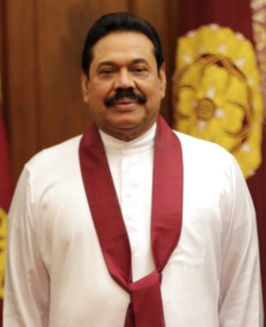
The president of Sri Lanka is the head of state and head of government of the Democratic Socialist Republic of Sri Lanka. The president is the chief executive of the union government and the commander-in-chief of the Sri Lanka Armed Forces. The powers, functions and duties of prior presidential offices, in addition to their relation with the Prime minister and Government of Sri Lanka, have over time differed with the various constitutional documents since the creation of the office. The president appoints the Prime Minister of Sri Lanka who can command the confidence of the Parliament of Sri Lanka.
In Sri Lanka, the Cabinet of Ministers is the council of senior ministers responsible and answerable to the Parliament of Sri Lanka. The President is a member of the cabinet and its head.

The Speaker of the Parliament of the Democratic Socialist Republic of Sri Lanka is the presiding officer of the chamber. The Speaker fulfills a number of important functions in relation to the operation of the House, which is based upon the British Westminster parliamentary system. The speaker is second in the Sri Lankan presidential line of succession, after the prime minister.
A Governor of a Province in Sri Lanka, is the head of the provincial council and representative of the President of Sri Lanka in the province. Established in 1987, under the 13th Amendment to the Constitution of Sri Lanka and deriving its powers from the Provincial Council Act No 47 of 1987, a governor exercises executive power in respect of subjects devolved to provincial council.

Sri Lanka has held several rounds of Provincial Council elections in 2008 and 2009 to elect members to eight of the country’s Provincial Councils. The decision to hold elections in different parts of the country on separate days was a break in the usual practice, which is to hold elections for the whole country on the same day. For each provincial council, members are elected to serve a five-year term. A chief minister for the province is chosen by the elected members.
The 1999 Sri Lankan provincial council election was held on 25 January 1999, 6 April 1999 and 10 June 1999 to elect members to seven provincial councils in Sri Lanka. No election was held in the eighth province, North Eastern, which had been governed directly by the national government since March 1990. The People's Alliance, which was in power nationally, won the majority of seats in two provinces. It was also able to form a majority administration in the other five provinces with the support of smaller parties such as the Ceylon Workers' Congress.
In Sri Lanka a Member of Provincial Council, is the title given to an elected member of a provincial council. As of 2017, there are 455 members in nine provincial councils.
Provincial governments of Sri Lanka are the devolved governments of the nine Provinces of Sri Lanka. In accordance with the Sri Lankan constitution, provinces have legislative power over a variety of matters including agriculture, education, health, housing, local government, planning, road transport and social services. The constitution also gives them powers over police and land but successive central governments have refused to devolve these powers to the provinces.
The Government of the Northern Province refers to the provincial government of the Northern Province of Sri Lanka. Under the Sri Lankan constitution the nine provincial governments of the country have power over a variety of matters including agriculture, education, health, housing, local government, planning, road transport and social services. The constitution also gives them powers over police and land but successive central governments have refused to devolve these powers to the provinces. Legislative power rests with the Northern Provincial Council whilst executive power rests with the Governor and Board of Ministers.
The Governor of the Central Bank of Sri Lanka (CBSL) functions as the chief executive of the Sri Lankan central bank. The post is the ex-officio chairperson of the Monetary Board of Central Bank of Sri Lanka. Since its establishment in 1950, the CBSL has been headed by sixteen governors. The governor has two deputies and several assistant governors. The inaugural officeholder was the American John Exter who served the Government of Sri Lanka in helping found the central bank. The position is currently held by Nandalal Weerasinghe who was appointed to the office on 8 April 2022.

Naseer Ahamed is a Sri Lankan politician serving as the Governor of the North Western Province, Sri Lanka. Naseer Ahamed has been active in Sri Lanka's political scene since 1994, having held various positions such as Cabinet Minister of Environment, Member of Parliament from the Batticaloa district, Chief Minister of the Eastern Province and more.
Isura Devapriya is a Sri Lankan politician who was the Chief Minister of the Western Province. He was appointed to the position on 8 September 2015, following the election of his predecessor, Prasanna Ranatunga, to parliament.

In the Sri Lankan Government, ministers are members of Parliament who hold appointments from the President to perform certain functions of government. This includes formulating and implementing policies and heading government ministries. Ministers collectively make up the executive branch of the Government of Sri Lanka. Constitutionally, the president is obliged to follow the advice of the prime minister on the appointment and dismissal of ministers.
In Sri Lanka, a Provincial Minister is politician, who is a Member of the Board of Ministers of a province.
The monthly allowance of a Member of Parliament (MP) in the Parliament of Sri Lanka is Rs.54,000 a month as of 2024. In addition, parliamentarians are able to claim allowances for attendance, to cover the costs of running an office and employing staff, and residence which can increase their gross pay to over Rs.270,000. Additional salary is paid for appointments or additional duties, such as ministerial appointments and serving as parliamentary officers.




